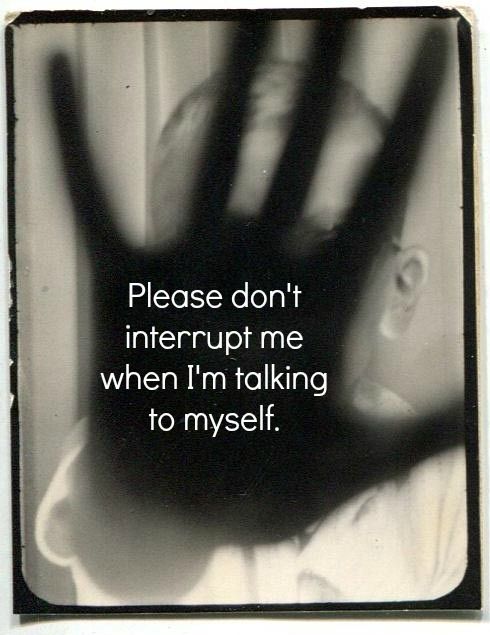Ask me a question such as this one – If you could wake up tomorrow and be fluent in any language you don’t currently speak, which would it be? – and the answer I’m most likely to give is one which won’t make sense in any language…
Unless you speak Tangential Thinking.
Then it might make a fragment of sense.
.
.
When I was younger I struggled to communicate with others.
That probably started when I refused to speak.
According to sources, I refused to speak. Whether this is true or not… I don’t remember as this was something which occurred in that too young to remember age range. If this was a real thing, which, knowing me, it could have been, it may have had more to do with the fact that no one in my early environment listened so there wasn’t any point in speaking. No one listened because everyone was too busy talking.
Why don’t people get that talking and listening (especially to the stuff you’re saying while talking) go together?
I really don’t understand human.
.
.
When I finally got around to trying to speak human… the futility of it often tripped me up.
However you’re supposed to keep trying when you fail, even when there really isn’t any point, until the whole exercise becomes trying to everyone involved.
The hardest part of speaking human is… the science of it.
Everything sounds copacetic in your head, but once it travels through those tubes which eventually lead to the mouth and hit the air with sound, then jiggles along airwaves to someone’s ears, in through those tubes to their head… it loses the copacetic and becomes chaotic.
Chaotic, as in… well… I always felt that I was talking Dr. Seuss to those who’d never learned to understand Dr. Seussian.
And talking is only a smidgeon of conversation.
There’s so much more going on, so many voices which aren’t always heard but are still vocal.
Body language is a loud substance.
Sometimes it is music, and sometimes… well… music can be cacophony to certain types of ears.
They say… in many languages… something along the lines of…
.
 Quote via some quotey page which was all up in crediting itself for the quote but forgot to give credit to the image they used for their quote – Cuban Smoking Lady – and didn’t explain why while doling out advice.
Quote via some quotey page which was all up in crediting itself for the quote but forgot to give credit to the image they used for their quote – Cuban Smoking Lady – and didn’t explain why while doling out advice.
.
However being yourself is easier said than done. It sounds good… but it is sometimes only music to your ears, to everyone else it is noise compared to their music.
Try to communicate with others who have access to the same self-affirming quotes that you do and…
We’re all speaking human, without necessarily listening to ourselves or others, or understanding any of it.
If I could wake up and be fluent in any language which I don’t currently speak… it would probably be as useless as the languages which I currently speak… if I don’t also understand human.
Whatever the language… if humans are speaking it… you need to be fluent in understanding human.
.



This is probably the best response to this prompt that anyone has thought of. I cannot believe we are both addressing this very same issue this week (mine posting tomorrow), but you have articulated it far better than I! I am going to ready it again. 😀
LikeLike
Thank you very much 🙂
I look forward to reading your post, you always dig deep, share insights, aren’t afraid of controversy (which is awesome), and are inspiring.
I’m house hunting at the moment and something you said a long while ago sticks with me and is a part of what guides me.
LikeLiked by 1 person
lol! I have always said I must have delexia of the thought and mouth! It always sounds really good when I’m thinking of what to say but the Time it comes out of my mouth isn’t the same elegant way I had thought it!
LikeLike
I think everyone experiences that, we’re all great dancers, artists, singers, orators, and wits in our heads, but then we try to do that in RL and… what happened to the person we were in our heads!?
There are some very funny memes reflecting that – How we see ourselves and how we actually are.
And this is sweet:
LikeLike
I love this post! 🙂 Yes, I sometimes feel that way, too, speaking Suessian when no one else gets it (I love that description, btw.).
LikeLike
Thank you 🙂
Years ago I saw a Billy Connolly gig in which he pointed out his style of joke-story telling, how he starts off at point A and goes off on many tangents from there but eventually always comes back around to point A at the end of it, therefore demonstrating that even though he may appear to go completely off subject, he’s actually well aware of the subject and hasn’t lost the plot. As I watched (he gesticulates almost as much as I do) and listened to him I recognised the way that I talk and suddenly I felt okay about it after decades of trying to alter my style.
Communication is a fascinating thing to explore.
LikeLike
Thanks for your infographic, it’s almost as if you’ve read my mind. For years I thought it was just me but then I made a career out of being creative so that didn’t matter so much. A friend of mine, an fellow INTJ mentioned that it’s a sign of low spectrum autism which at least gave it some meaning. Although, I’ve never sought to be tested for it.
I have something else odd as well. When I look at a spreadsheet, especially one with repeating and similar numbers, I become totally disoriented and lose any context of column, row or even the task I had in mind. Sometimes, I have to print out spreadsheets and use rulers to actually be able to work with them.
LikeLike
Thank you for sharing 🙂
I’m an INTP – the INT part means that INTP’s and INTJ’s have similar styles of thinking and experiencing their minds. The difference is the ‘P’. It makes me prone to not accepting anything as fact, including what I think of as fact, because there are too many variables and ways to perceive the same thing or concept.
Humans once thought the world was flat, that was fact, and anyone who suggested it was spherical was considered insane. Hmmmm…
It always strikes me as curious the way that people who think differently tend to assume that the difference points to an anomaly in the other which may be faulty.
And what is faulty? One person’s fault may be another’s ideal. A goal for one team may be the other team’s loss.
For instance – I have dyslexia. This can be viewed from many different angles. The most common angle from which it is viewed is as a disability because it can cause problems with learning and reading. Why does it cause those problems – because the education system was created by people whose brains were not wired the way that a dyslexic brain is wired. Had that system been created by a dyslexic brain, those who do not have dyslexia would be the ones with the problems and disability. The dyslexic brain would be the norm by which other brains are assessed.
INTJ comes with the tag – Mastermind. What’s a mastermind. It’s often someone who thinks differently from others, and who may feel very different. Sometimes they’re viewed as crazy by others until their ‘crazy’ turns out to be innovative and beneficial, then suddenly ‘crazy’ is labeled ‘genius’. And people may wonder how come no one ever thought of that before. The difference made all the difference.
INTJ’s think differently, it’s a blessing and a curse all rolled into one.
INT’s tend to be more aware of the workings of their mind because their focus is inwards – hence they’re liable to think that no one else thinks the way they do because they’re more aware of their individual style, of the style of others, and a lot of people don’t spend time getting to know how their minds work because their minds don’t work that way. They aren’t focused internally, and are thus not aware of every fluctuation and process of the inner cogs.
Every ‘problem’ comes with a ‘solution’ built into it. If you could read spreadsheets easily would you be as creatively able as you are? Would you have considered a creative life if you’d not found an obstacle in your path?
Sounds to me as though you’re a visual thinker – There are some intriguing tests and studies online for exploring learning and thinking styles, the main styles identified are – Visual, Auditory, Kinesthetic. These are simplified for ease of use, and can be helpful, but it’s important to remember that we often have all the styles, variations of them, blends, and we tend to prefer one more than the others, we individualise our own system based on how our brain wired itself during the phase of developement when our neural system was evolving and forming.
What you described re: spreadsheets, especially with numbers, is something I can relate to. My mind jumbles what it sees, and numbers look like they’re moving which is problematic as 9’s become 6’s, 5’s become 2’s and vice versa, and they often switch places, so 276 can become 627. I also have devised methods to deal with that.
Dyslexia has certain similarities to Aspergers, and some of the methods which I use to cope with dyslexic ‘problems’ can make me appear to others as though I have low spectrum autism, or OCD (I have to keep double, triple, quadruple checking things to make sure I read or did them correctly). I can seem to be slow, when in fact my mind is moving too fast and so I have to slow it down, make an exhausting effort to focus. I can appear to be obsessed with one thing, that’s just me trying to stop being so dispersed that I focus on everything and nothing.
Dyslexia is actually a blessing when it comes to creative work, as the visual thinking centre is enhanced.
Can you spin objects around in your mind and perceive them from different angles? Visual thinking does that without even thinking about it.
Have you ever taken an IQ test – which section did you find easy.
Focus on what you do well and less on what you don’t do well. What seems to be ‘wrong’ may be what is ‘right’. The small details are part of the bigger picture.
You might enjoy this, it’s a bit of insightful fun:
In some respects it is just you – you have an individual style – but all of us share similarities. One of those similarities is that we all tend to think – Shit, I’m weird! – and think it’s just us. The internet is a great way to realise that it is us and it’s also others. There’s a collective voice saying – Is it just me? – and a collective answer which says – Yes-no, we’re similar, but we kind of like our dissimilarities, we just don’t want to be all alone with them.
Or something like that (INTP disclaimer) 😉
LikeLike
Just like the first image in this post, speaks for me
LikeLike
It’s an excellent diagram of the complexity of communication. I also relate to that image. There times when translating thought into words, particularly ones which make sense to others, seems an impossible task. 🙂
LikeLike
Yup, sometimes just sit there and just let that thought flow 😉 Did you make that diagram ?
LikeLike
I didn’t create the diagram, I found it while browsing INTP related pins on Pinterest. It was uploaded by a Pinterest User so there’s no link to source of origin (maybe the User created it but they didn’t specify that). I tried doing an image search to find where it came from but only ended up where I started, after a detour through a bunch of things Google Image search results thought might be similar.
I’ve occasionally tried to express the same idea when trying to explain my communication style/thought processes to others, but my attempts tend to be garbled, go off on wild tangents, and unclear, not wonderfully succinct like the diagram. 😉
LikeLike
Understand, so lucky that we found this image, saving extra words. Definitely saved it to my pins 🙂
LikeLike
LikeLike
LikeLike
Indeed!
Have you seen this one – https://uk.pinterest.com/pin/313563192780207729/
LikeLike
Not seen both before, but can imagine that 🙂
LikeLiked by 1 person
Excellent!
This one always makes me chuckle when I see it – https://uk.pinterest.com/pin/313563192781500575/
LikeLiked by 1 person
Indeed, the “tab” makes me chuckle too
LikeLike